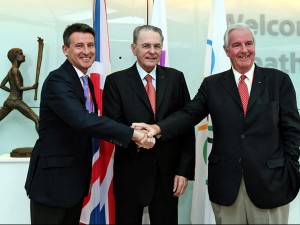London will leave lasting legacy, vows Reedie

IOC President Jacques Rogge, center, is welcomed by London 2012 Olympic games chairman Sebastian Coe, right, and the IOC member for Great Britain Craig Reedie on his arrival for the London 2012 Olympic Games . AP FILE PHOTO
LONDON – The London Olympics may have cost more than £9 billion ($14 billion) to stage but one of Britain’s top sports officials has insisted the benefits will be felt long after the end of the Games.
Craig Reedie, who on Thursday became the first Briton in almost 50 years to be elected a vice-president of the International Olympic Committee (IOC), has spoken out against critics who have doubted how claims about legacy, a key factor in the London bid’s success, could ever be transformed into reality.
“Everyone thinks your money is spent on the Games,” Reedie said Friday. “It’s not. It’s spent on infrastructure.
“It’s spent on East London. About 75 percent of spending is on infrastructure and 25 percent on sports facilities. That’s a huge addition.”
Fears about the legacy increased when a projection of London 2012 creating one million extra sporting participants was dropped by the last British government just 18 months before the Games.
But Reedie, one of the two principle leaders and the main architect of London’s bid, believes that both the physical and the ‘softer’ legacies of these Olympics will endure.
“Will we inspire a generation? Well, firstly, physically: there will be absolutely unbelievable development of (the post-Olympics) QE park.
“That is a £7.2 billion gift from sport to the city of London. That will mature, change, and develop new housing and new jobs over the next 60 or 70 years. I don’t know how you put a value on that. It’s just fantastic.”
Reedie did though acknowledge high profile problems, notably the prolonged wrangle over the future of the Olympic Stadium, involving three football clubs, West Ham United, Tottenham Hotspur, and Leyton Orient.
“Every time you are involved with football you end up with an argument,” he said caustically before emphasizing other, more positive, outcomes.
One is the ‘softer’ legacy of people taking up sport.
“Sport England now says there are 1.3 million people, young people, involved with sport, more than before London won the Games,” Reedie said. “Let’s salute that.”